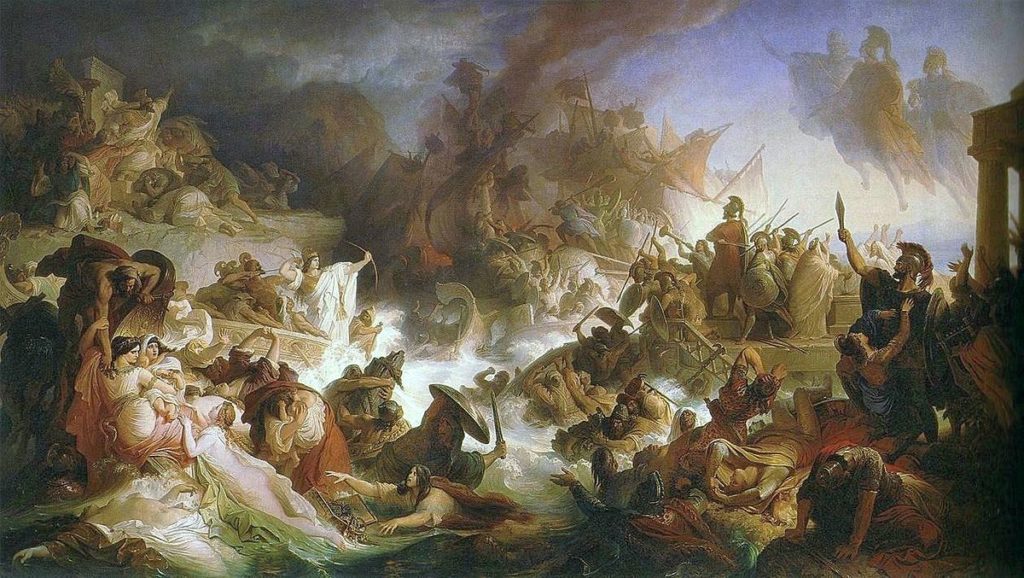[Greek] ἐρημία (erēmia), [Latin] erimeta: wilderness (a place for a hermit), desert, desolate place, place of desolation (destruction), hermetic place, deserted place, uninhabited place, solitude, lonely place; Mt.15:33, Mk. 8:4, 2Cor.11:26, Heb.11:38

The Battle of Salamis (painting by Willhem von Kaubach 1864): The once-beaten and outnumbered Greeks, forced to abandon Attica and Athens, later outmaneuver the Persian King Xerxes and his soldiers at the island of Salamis
Background Information:
Battle of Salamis: This term can mean desert, wasteland, empty place, abandoned place, or unpopulated place. This event was a naval battle fought between the Greek city-states and the Persian Empire under King Xerxes. Earlier, the once-defeated Athenians abandoned Athens and evacuated the population of Attic to the island of Salamis. Herodotus’ Histories 8.65 states, “Dicaeus said that the land of Attica was being laid waste by Xerxes’ army and there were not any Athenians in the country.” The outnumbered Greeks eventually outmaneuvered the Persians and later won the war.
Old Testament: This term, occurring over 130 times, is related to three Hebrew terms. Two of these terms convey the subject (object) of desolation, waste, and devastation. Interestingly, these terms appear very frequently. The third Hebrew term conveys the active sense of causing destruction, laying waste, making desolate, being in ruins, drying up, attacking, destroying, and killing (slaying). Kings and others are slain. Cities, landmarks, and places are destroyed. The waters were dried up from off the earth (Gen.8:13). The kings of Assyria have destroyed the nations and the lands (2Kg.19:17). Those nations shall be utterly wasted (Isa.60:12). That this house shall become a desolation (Jer.22:5). Thy prophets are like the foxes in the deserts (Eze.13:4). I will make the cities of Judah desolate (Jer.9:11). They have made my pleasant portion a desolate wilderness (Jer.12:10).
New Testament: On the other hand, this term occurs only four times in the New Testament. This term, meaning lonely place, refers to a deserted place, wilderness, or desert. Interestingly, such examples do not illustrate the sense of violence or destruction. This deserted place is characteristically described as a dangerous place, where demons reside, where refugees and outcasts reside, and where dangers to the body (and soul) reside. The wilderness of Israel has been historically been linked with disobedience to God and God’s signs and wonders.
Jesus: Interestingly, Jesus views the wilderness in a much more positive manner. This place is where Jesus goes to escape from the crowd and the disciples. The wilderness is a place of quiet to spend time in the stillness of prayer with God the Father. The wilderness is a quiet place for His disciples. The wilderness becomes the starting point for the mission of John the Baptist where he fulfills the prophecy of Isa. 40:3. John becomes the voice crying in the desert, preparing the way of the Lord.
Scripture:
“The disciples said to Him, ‘Where could we ever get enough bread in this deserted place to satisfy such a crowd?’” Mt. 15:33
The disciples show their lack of faith and trust in how the crowd was going be provided for.
“The world was not worthy of them. They wandered about in deserts and on mountains, in caves and in crevices in the earth.” Heb.11:38
Paul was making reference to the faith of the ancients in the Old Testament. In 1Macc.2:27-29 Mattathias and his sons fled to the mountains, leaving behind in the city all their possessions. Many who sought righteous and justice went out into the wilderness.
Conclusion:
Hermit, hermetic, hermitage
I was somewhat surprised by the high number of references to destruction, devastation, and laying waste in the Old Testament. Perhaps, this is in part due to man’s sinful nature and God’s wrath. Although it makes sense, I guess I really never associated destruction, desolation, and hermits in the same context.
A hermitage can be any dwelling (building) where a hermit resides. In early Christianity, this was a place (spiritual retreat) where religious men lived to escape the temptations of the world. A hermitage is also a place where aristocrats, politicians, and other influential persons have resided in retreating from their responsibilities.
On the other hand, I was really surprised by the very sparse use of this term in the New Testament. Jesus saw the wilderness as a place of refuge, solitude, and a place of prayer.
The hermetic seal is thought to be originally invented by an alchemist. This seal became associated with Hermes Trismegistus, the god of alchemy.
The ancient city of Attica was famous for its figs. The ruler of Attica actually made it illegal to export figs out of Greece. The Persian King Xerxes, after his defeat by the Greeks, had figs served him at every meal to remind him that he did not possess the land where this fruit grew. Go figure!
